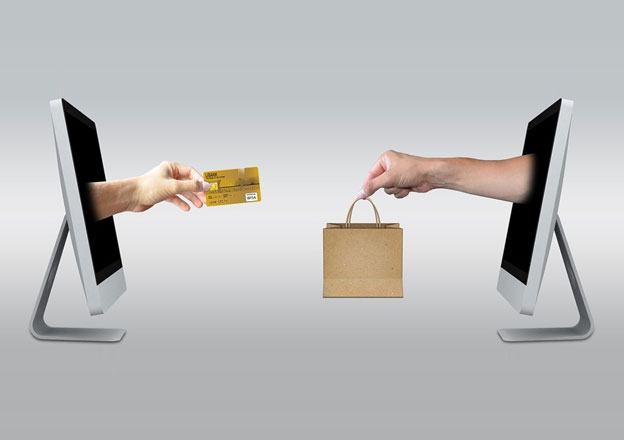E-commerce Trends That Are Powering Online Retail Forward

Let’s face facts: although the rest of the globe has felt the effects of the economic crisis, the online retail industry has not. Despite shifts in the economy, consumer preferences, and technological advancements, online retail has continued to develop and thrive. These alterations will be permanent. In previous years, advancements in online retailing have continued this trend.
By compiling data on historical trends, current market conditions, and anticipated changes, we can predict what the E-COMMERCE AND M-COMMERCE sector will look like. Here’s the research on everything you need to know to make 2022 and beyond a banner year for online retail.
Thanks to E-commerce developments, online retail will continue to thrive in 2022 and beyond.
The Impact of Augmented Reality (AR) on Retail
Thanks to augmented reality technology, internet shopping has reached new heights of immersiveness. It aids in simulating in-store shopping environments on E-commerce websites, drawing in customers and setting one business out from the rest.
By using augmented reality, stores may boost conversion rates by 40 percent, and the industry is expected to grow to $50 billion by 2024.
Augmented reality technology simplifies the purchasing process by showing potential buyers precisely what they’ll be getting (Without seeing it in person, they can feel it). It has been demonstrated that augmented reality serves as a motivating element that encourages people to engage in online buying. As increasingly online retailers use augmented reality, it is likely to become the norm in the sector.
An Increase in the Use of AI to Analyze Customer Data
Big data and artificial intelligence technologies are more versatile than process automation. The goal of AI is to automate formerly labor-intensive tasks, such as the initialization of user-specific features or the scheduling of CRM emails. By streamlining these labor-intensive procedures, they save both time and money.
Artificial intelligence (AI) has helped French E-commerce sites increase sales forecast accuracy, personalize product recommendations, and better understand their clientele.
For instance, online retailers utilize sophisticated algorithms to analyze customer purchases to generate personalized suggestions. Artificial intelligence algorithms effectively optimize prices, and marketing campaigns, get insights into customers’ behaviors and spot fraudulent or high-risk investments.
It shows customers that the company values their opinions and is prepared to adapt to their needs.
The Advent of Voice-Enabled Commerce Ushers In Fresh Prospects
People increasingly rely on smart speakers like Google’s Home, Alexa, and others to conduct voice-enabled online product searches and make purchases. Companies are adjusting their content strategies to focus on specific topics and long-tail keywords. Like Amazon streamlines repeat purchases by keeping track of your preferred brand and amount, voice commerce can make shopping a breeze.
For instance, the keywords are included in a slightly different fashion to make the content search engine optimized. For example, customers looking for black pants would input “Black jeans” into a search engine. Voice search users, on the other hand, are more likely to frame the query as a question such as “Where can I locate the blue jeans?”
With On-Site Customization, You May Create Unique Encounters Right Away
The expectation of a tailored online experience among all types of consumers and business clients alike has grown in today’s hyper-connected world. Artificial intelligence (AI) has made it possible to tailor a user’s experience in real-time, from the products they see to the assistance they receive. Companies using AI to glean valuable insights can give their consumers what they want: a personalized experience. According to the report, firms actively working to scale their customization capabilities have seen a fourfold increase in income.
Expanded Variety of Payment Methods Allows For More Individualized Checkout
The widespread availability of mobile payment solutions has gotten out of control. Furthermore, Amazon has implemented automated checkout at one of the grocery stores, where the walk-out system immediately deducts the money from the stored credit card by identifying the products and the quantity.
While credit cards remain a convenient payment option, one survey found that consumers are demonstrating less of a preference for using them. In this context, a new pattern of “buy now, pay later” purchases is developing. Users with solid credit card ratings are given preference for the financing choice. Users with bad credit ratings can still obtain access to financing, although at much higher interest rates. Brands may better cater to customers’ requirements by dividing them into several credit-worthiness groups.
The Rise of Chatbots Has Been Crucial In Improving the User Experience
Many modern consumers would instead not buy without the help of a salesperson. The chatbots powered by AI are just what retail sales staff has been waiting for. When clients are angry because they have to wait to acquire the product, they are the best option. These days, chatbots are often used in the customer service industry.
By 2025, it is expected that the chatbot market will have grown to $1.25 billion, with 47% of consumers favoring buying things via chatbots.
Artificial intelligence bots are continually taught by seeing and learning from user actions. Bots have shown their worth to online retailers by enhancing the shopping experience by recommending items customers might be interested in before they ever search for them.
Sales May Be Increased By Incorporating Social Selling Into Online Stores
Online marketplaces are leveraging social media to expand their customer base and exposure. Shopping on social platforms bolsters the social presence important to E-commerce marketing strategies. Users can do more than just window shop on social media thanks to features like Facebook stores and Instagram’s checkout. You can’t even compare it to Pinterest. Rich pins, such as product and buyable pins, let users read product information like price and availability without leaving Pinterest.
B2B Trade Is Undergoing Evolution
With the global pandemic resolved, B2B companies are no longer reluctant to engage in internet commerce. The best business-to-business (B2B) companies are not just digitizing their B2B sales but also maximizing the transformative shift throughout their operations, workflow, and procedures. Enhancing the user experience is essential to providing a smooth purchasing process.
B2B companies are moving beyond just optimizing their digital journeys to find new methods to express their brand’s narrative, communicate with customers, produce content, accept more payment types, and increase transparency in their cash flow.
Sales in The Online Retail Sector Can Benefit From PWAs
Leveraging the most recent advancements in web technology, progressive web apps (PWAs) provide users with an experience more akin to a native app on their mobile device. PWAs are easy on the system resources, quick to load, filled with features for user engagement, and trustworthy in their service to the user.
Worldwide, e-commerce firms are increasingly putting resources into progressive web apps. To provide consumers with an experience on their mobile devices comparable to that of a native app, the adoption of progressive web apps (PWAs) has risen in Asia, Africa, and the Middle East.
In Conclusion
E-commerce businesses might benefit from enlisting the most up-to-date trends, causing them to make significant achievements. You can’t use them since they aren’t compatible with all online shops. No online retailer, however large, can offer all of them. The shop must choose which fad would best assist them in increasing sales and return on investment while setting themselves apart from rivals. You are responsible as a business owner for considering potential outcomes, weighing options, and setting priorities based on emerging market trends to make everyone happy. For optimal results, implement, test, and iterate.
Author Bio
Alison Price
Alison Price is an Ohio-based researcher having multiple technical degrees. Her enthusiasm for new and latest technologies makes her different from her peers. She is a master of writing on a vast range of topics with extremely well-researched and well-structured data. Her presentation skills and convincing power helps her win the trust of her clients. Apart from the technical side, she loves to travel and get exposure to amazing cultures and traditions.
Write For Us
Gain multichannel inventory visibility and control with eChannelHub
Learn more about eChannelHub with a free demo, tailored for your unique retail business.
Request A DemoRequest a Demo
Gain multichannel inventory visibility and control with eChannelHub
Learn more about eChannelHub with a free demo, tailored for your unique online business




